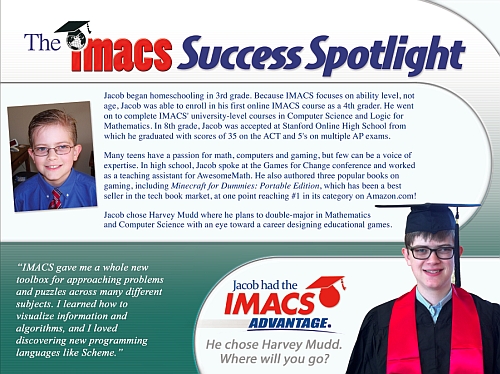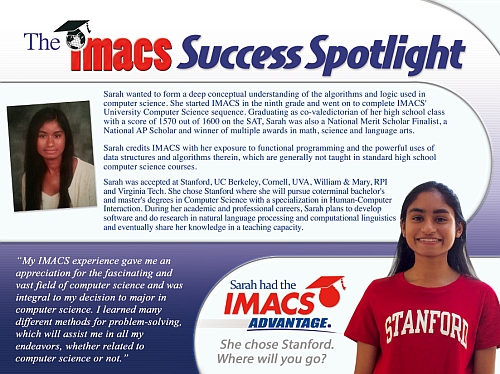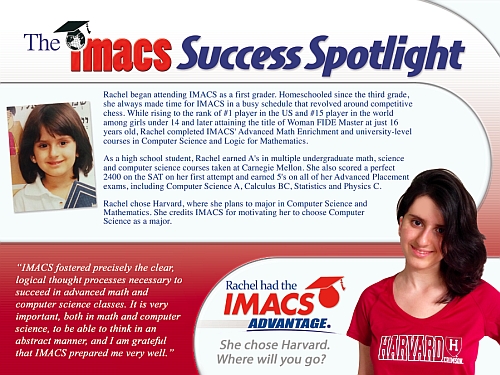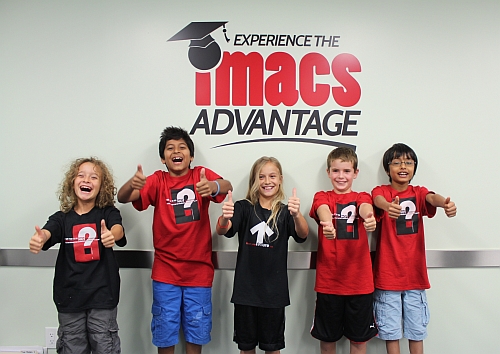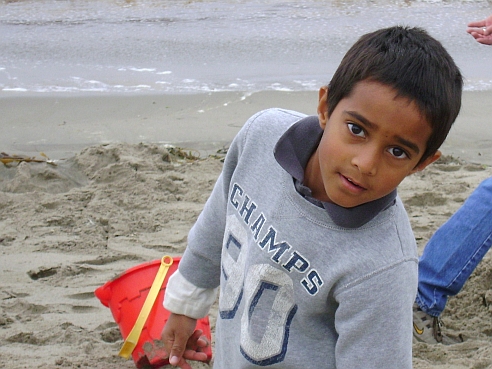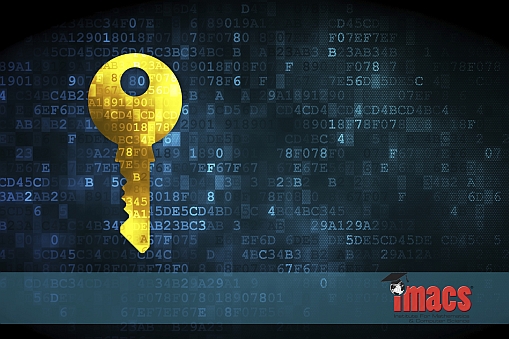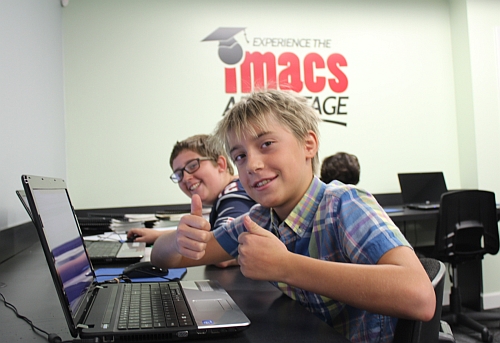
Jacob began homeschooling in 3rd grade. Because IMACS focuses on ability level, not age, Jacob was able to enroll in his first online IMACS course as a 4th grader. He went on to complete IMACS’ university-level courses in Computer Science and Logic for Mathematics. In 8th grade, Jacob was accepted at Stanford Online High School from which he graduated with scores of 35 on the ACT and 5’s on multiple AP exams.
Many teens have a passion for math, computers and gaming, but few can be a voice of expertise. In high school, Jacob spoke at the Games for Change conference and worked as a teaching assistant for AwesomeMath. He also authored three popular books on gaming, including Minecraft for Dummies: Portable Edition, which has been a best seller in the tech book market, at one point reaching #1 in its category on Amazon.com!
Jacob chose Harvey Mudd where he plans to double-major in Mathematics and Computer Science with an eye toward a career designing educational games.
“IMACS gave me a whole new toolbox for approaching problems and puzzles across many different subjects. I learned how to visualize information and algorithms, and I loved discovering new programming languages like Scheme.”
Sarah wanted to form a deep conceptual understanding of the algorithms and logic used in computer science. She started IMACS in the ninth grade and went on to complete IMACS’ University Computer Science sequence. Graduating as co-valedictorian of her high school class with a score of 1570 out of 1600 on the SAT, Sarah was also a National Merit Scholar Finalist, a National AP Scholar and winner of multiple awards in math, science and language arts.
Sarah credits IMACS with her exposure to functional programming and the powerful uses of data structures and algorithms therein, which are generally not taught in standard high school computer science courses.
Sarah was accepted at Stanford, UC Berkeley, Cornell, UVA, William & Mary, RPI and Virginia Tech. She chose Stanford where she will pursue coterminal bachelor’s and master’s degrees in Computer Science with a specialization in Human-Computer Interaction. During her academic and professional careers, Sarah plans to develop software and do research in natural language processing and computational linguistics and eventually share her knowledge in a teaching capacity.
“My IMACS experience gave me an appreciation for the fascinating and vast field of computer science and was integral to my decision to major in computer science. I learned many different methods for problem-solving, which will assist me in all my endeavors whether related to computer science or not.”
Rachel began attending IMACS as a first grader. Homeschooled since third grade, she has always made time for IMACS in a busy schedule that revolved around competitive chess. While rising to the rank of #1 player in the US and #15 player in the world among girls under 14 and later attaining the title of Woman FIDE Master at just 16 years old, Rachel completed IMACS’ Advanced Math Enrichment and university-level courses in Computer Science and Logic for Mathematics.
As a high school student, Rachel earned A’s in multiple undergraduate math, science and computer science courses taken at Carnegie Mellon. She also scored a perfect 2400 on the SAT on her first attempt and earned 5’s on all of her Advanced Placement exams, including Computer Science A, Calculus BC, Statistics and Physics C.
Rachel chose Harvard, where she plans to major in Computer Science and Mathematics. She credits IMACS for motivating her to choose Computer Science as a major.
“IMACS fostered precisely the clear, logical thought processes necessary to succeed in advanced math and computer science classes. It is very important, both in math and computer science, to be able to think in an abstract manner, and I am grateful that IMACS prepared me very well.”
Related Blog Posts:
The IMACS Blog is taking a short summer hiatus and will return next month. Have a safe and happy 4th of July!
—Jo Boaler, Professor of Mathematics Education, Stanford
The above quote comes from a recent article by Stanford professor Jo Boaler. Professor Boaler, through her Youcubed organization, advocates for valuing depth and creative problem-solving over computational speed and memorization in K-12 math education. She further argues that classroom emphasis on the latter is partly to blame for the poor understanding and dislike of math in the US and the unfortunate belief by some students that they are not "math people."
How did the US get to a place where so many people think that math achievement is indicated by a limited and limiting set of skills? Would you really measure achievement in literature or composition by how well and quickly a student spells and punctuates? Of course not! Language arts subjects are accepted as a form of art with all of the associated depth, creativity, and multifaceted approaches to thinking. Although genuine mathematics shares these characteristics, for decades school math has typically skimmed the surface of math knowledge, allowed little room for creative thinking, and focused on the "right" way to get the answer.
While math assignments are constructed and graded rather narrowly, language arts assignments are regularly assessed for creativity and style in addition to technical proficiency. But did you know that professional mathematicians also place a high value on creativity and style when it comes to reviewing each other’s work? Clever and elegant proofs are admired far more because they unveil and illuminate the inherent beauty in mathematics in ways that technically correct but unwieldy proofs cannot.
At the K-12 level, an educator skilled in mathematical thinking can teach even the youngest students the kind of rich mathematics that inspires creative problem-solving and a genuine love of learning. It is these skills, not computational speed and memorization, that will better prepare students for success in the modern world.
"My kid could finish his math homework in no time if he would just do it, but instead he drags it out for an hour, and that’s with me having to nudge him through it." Sound familiar? Parents and teachers often assume that a gifted child will automatically be a high achiever given the child’s high abilities, so it comes as a surprise when he or she underachieves. There can be a variety of reasons for underachievement, but a common cause is lack of motivation. Whereas bright students often enjoy working toward external recognition for their accomplishments, gifted learners may not value outside praise as much, particularly if given for activities that do not enhance their learning experience. A child may think, "I already know it, so why should I have to spend time proving that to someone else, especially someone who knows that I know it?"
Parents and teachers searching for ways to reignite motivation in an underachiever would do well to appeal to his or her intrinsic love of genuine learning. Because gifted children typically require little effort to learn standard curricula, they need additional challenges that demand meaningful effort. The satisfaction that talented athletes feel after bearing the weight of a true physical challenge fuels their fire to push to the next level. Talented minds need to feel that same kind of satisfaction, the kind that comes from bearing challenges that have true intellectual weight, so they can make the connection between effort and achievement. Providing those challenges is a first step to bringing back lost motivation. For additional strategies on enhancing motivation in gifted children, visit the Davidson Institute for Talent Development.
the magnificent Atlantis Hotel on a family trip to Dubai.
When fewer than 1% of 2014 college-bound high school seniors attain a perfect 800 on the math section of the SAT, you know that you’ve met someone special when he’s achieved that amazing feat before even cracking the teen years. That someone is Shiva Oswal, a precocious 11-year-old from Northern California who recently earned that lofty score as part of a program through Johns Hopkins’ Center for Talented Youth (CTY) called the Julian C. Stanley Study of Exceptional Talent (SET). In fact, the probability of an 11-year-old earning a perfect score is less than 0.01%!
According to its website, SET "was created to help extremely talented students achieve their full potential, and, through its research and advocacy initiatives, to enhance the educational opportunities available for all academically advanced students." Those who qualify through their SAT scores gain access to individualized educational counseling and opportunities to connect with mentors and intellectual peers.
How did Shiva do it? The multi-talented board game designer and aspiring professional soccer player mostly studied on his own by taking SAT practice tests. He kept acing the math section at home, so he felt confident that he had done equally well on the real thing, and indeed, he had. (By the way, Shiva is happy with his performance on the Critical Reading and Writing sections too!) His parents, Arvinder and Vikas, are extremely proud, but they also realize the magnitude of the journey known as raising Shiva.
The Moment You Know Your Child is Gifted
When Shiva was around two years old, his parents noticed that he was able to master abstract concepts and make many logical connections. He often saw patterns and anomalies that others overlooked. For example, having observed that cars had license plates with letters and numbers, he was quick to notice a car with an all-numeric license plate and proceeded to ask numerous questions to understand why. The same thing happened when later that week he saw a car with just letters on its license plate.
As with many gifted children, Shiva enjoys probing a subject thoroughly and persistently asks questions in an attempt to acquire deeper knowledge. "How fast can a cheetah run?" "What will happen if it fights an elephant?" "Is a cheetah faster than Spiderman?" These are just some of the questions that his mother, Arvinder, remembers from a time when two-year-old Shiva was intensely passionate about the swift, spotted feline.
By age four, Shiva was solving math problems in his head. When his preschool teacher asked the class how many hundreds make a million, Shiva promptly responded with the correct answer, 10,000, even though he had never been exposed to the concept of multiplication. At that point, Arvinder and Vikas, were certain that their son was gifted. "We felt a sense of responsibility and were quite unprepared to deal with the needs of a relentlessly curious and intensely gifted child," recalls his mother.
From School to Homeschool
As residents of the Silicon Valley area, the Oswals have access to some of the best schools, public or private, in the United States. During the first few weeks of kindergarten, Shiva was very excited to go to school and usually sat in the front row, eager to learn. Over time, the limited intellectual stimulation led to a decline in his interest in school. By the end of second grade, Shiva frequently announced that lunch and recess were about the only things he looked forward to at school. This is when his parents knew that they needed to look for alternatives.
"While schools did the best they could, they were neither adequately prepared nor widely exposed to what it takes to meet the needs of the gifted child and hence lacked the ecosystem to adequately challenge the gifted mind," explains Arvinder. After a few months of intense reflection and research, they concluded that homeschooling would probably best suit Shiva.
One of the key benefits of homeschooling is the ability to customize an education specific to a child’s passions. Of course, homeschooling has hurdles too. As Shiva’s mom describes, "The primary challenge is that most of the research (to design an optimal experience) rests on the shoulders of parents because designing a sufficiently challenging and engaging learning experience requires an intimate knowledge of the individual child’s passions and strengths."
Resources for Gifted Students
Meeting the educational needs of an extremely bright but young person such as Shiva is no easy task. For his parents, the main difficulty is to continuously find resources of increasing complexity and to pursue these without extinguishing the love of learning. Balance and a sense of what truly matters in life act as guiding principles. "Our hope is that Shiva lives a joyful and fulfilling life while pursuing his passions to the fullest, and we hope he is minimally affected by extraneous factors such as the pursuit of wealth, fame or approbation."
The Oswals have found that the most relevant resources for Shiva have been either online or in classes with small groups of passionate, gifted kids with shared interests.
"Self-paced, online programs such as Elements of Mathematics: Foundations from IMACS are uniquely suited to adequately challenge the mathematically gifted," shares Arvinder. "Our son loves EMF as it allows him to accelerate at his own pace and level up accordingly."
Other online programs that have worked for Shiva include Guinevere’s Gifted Group also known as Online G3. G3 classes are grouped by skill level rather than chronological age to allow asynchronous learners to accelerate as needed. Shiva also loves the Druidawn creative writing program, which taps into "the multidimensional and kaleidoscopic world that resides within the gifted mind."
Live Resources and Events
In addition to online courses, Shiva has benefited from small, live (or live streamed) classes. He loves attending classes taught by Dr. Lucian Sega who encourages gifted students to engage in sustained, rigorous mathematical pursuits. As Vikas and Arvinder explain, "Dr. Sega’s ability to make a broad range of advanced, often abstract mathematical concepts crystal clear is stunning. We find ourselves wishing we could travel back in time to restart our own secondary math education with him!"
For introducing a wide range of math concepts in an engaging way, the Oswals are grateful to Yul Inn of the Fun Math Club. Another extraordinary educator and entertainer who has taught the Oswals much is Dr. Arthur Benjamin. "Our family has enjoyed his Mathemagics shows numerous times. Each time we’ve watched him in action, we gained a new insight, a heightened love for learning or both!"
Other Important Resources
Additional resources can be found through support organizations such as Gifted Homeschoolers Forum, the Davidson Institute for Talent Development, Hoagies’ Gifted Education Page, the TAGMAX listserv and the National Association for Gifted Children.
The Journey
The responsibility of nurturing a young, gifted child takes heartfelt dedication and constant work to continually build an ever-evolving system of resources and support. It is, without a doubt, a labor of love as only a parent can know it, both the wonderful strides and the worrisome stress. But it is all part of a unique path that each family with a child like Shiva must forge together.
As Shiva’s mom put it beautifully, "An important part of what we do has to do with ‘the journey’. The journey has not been delegated. The fondest part is that we are traveling on this journey together. We are constantly amazed at how far a child can go when allowed to freely pursue a passion-centric learning approach. It’s been a joy to see Shiva surprise us every day with out-of-the-box solutions. We are very grateful for all that we are learning together as a family because we often satisfy curiosities rather than march to fulfill an external mandate or to earn a grade."
Editor’s Note: Shiva’s parents granted IMACS permission to disclose his status as a Davidson Young Scholar and as a participant in the CTY SET program.
The ability to delay gratification has been shown in various studies to be a strong predictor of academic success, even more so than IQ. Can parents help nurture this ability in children? Yes! But it takes more than a didactic approach. Many parents are probably familiar with the famous marshmallow experiment where young children were given a choice between one marshmallow now or two if they could wait 15 minutes. It’s helpful to recall that the original experiment focused not on whether the children could wait but rather on what strategies helped them to wait. Rochester University researchers later conducted a variation on the experiment to test how prior experiences affected wait time. They first conditioned the children with kept or broken promises of better art supplies and bigger stickers if they waited. In the marshmallow test that followed, children who were rewarded as promised for waiting were more likely to exhibit self-restraint than those who were let down after having waited. With that in mind, here are three tips for helping children learn the good habit of delaying gratification:
Mind Over Matter: Encourage younger children to redirect their mental focus to something else, preferably something pleasant, while they wait. As the saying goes, time flies when you’re having fun. Playing outdoors is usually an effective way to change one’s frame of mind. Another approach is to help kids put their natural creativity and boundless imagination to use in thinking up ways to ignore or recast in a negative light the source of immediate satisfaction. If your child wants to play video games before finishing homework, what if he pretended that the PlayStation were really a portal used by savage aliens seeking to conquer planet Earth, and the only way to close the gateway and thwart the evil empire was to finish his homework first?
Give and Keep Your Word: Set age-appropriate rewards for exhibiting self-restraint, including interim milestones for longer-term goals. Establishing a savings account is a wonderful example of a longer-term project. Not only can it help foster self-control, but you can also use it to help build basic arithmetic skills when children are young and to teach about compound interest when they are older. Most importantly, follow through on whatever you promised.
Walk the Walk: Model the desired behavior by sharing with your children when and why you delay gratification as well as the net positive gains you accrue from your self-restraint. For example, resist the urge to grab fast food when you’re out so that you have room for a healthful meal at home and feel healthy afterwards. Or skip buying the sale shoes that you only sort-of like and save up for the pair you absolutely love!
The Institute for Mathematics and Computer Science (IMACS) recently released its first online algebra course, Algebra: Groups, Rings and Fields. This is the tenth course in the Elements of Mathematics: Foundations (EMF) program for talented secondary school students. Our latest self-paced offering has generated a fair amount of inquiries from parents seeking options for their mathematically advanced child. The answers to some of those questions can be found in the FAQ at EMFmath.com. IMACS responds to others, which have been consolidated by topic, in this week’s blog post.
Q: My child aced pre-algebra and is ready for algebra. Why can’t I just enroll her in the first EMF algebra course?
When people use the term “algebra,” they’re usually talking about high school algebra or what mathematicians call “elementary algebra.” By contrast, EMF teaches the kind of algebra that a mathematics major at university learns called “abstract algebra.” A student who has mastered pre-algebra is, no doubt, ready for high school algebra. However, this same student, no matter how talented, is simply not ready to jump directly into abstract algebra.
Why? Just as success in high school algebra is built on the foundation laid by elementary school math up through pre-algebra, success in abstract algebra requires a strong foundation in various mathematical structures and reasoning techniques that are rarely taught outside of a university setting. This important foundation is built up through the first nine courses of the EMF program. In fact, one might think of these early courses as constituting “pre-abstract algebra.” As such, they are an integral part of the EMF program and essential to success in the later courses.
In case you’re wondering, students who complete the EMF algebra courses will have learned all of elementary algebra and be able to solve any high school algebra problem with ease. But they will also have learned a great deal more and be well-prepared to study the high-level mathematics that is at the heart of important disciplines such as particle physics and cryptography.
Q: What if my child already took high school algebra and geometry? Is there anything left for him to learn in EMF?
As IMACS principal founder and EMF co-author, Burt Kaufman, once wrote, “It is surely a sad state of affairs that in the traditional high school curricula, the student encounters very few, if any, mathematical ideas that postdate the seventeenth century. … It would be ludicrous if an English curriculum for the high school never contemplated confronting the student with a piece of literature written after Shakespeare.”* That’s one key reason why the EMF curriculum was created—to teach modern mathematics to talented, young students who are capable of benefiting from advanced material that goes beyond the outdated math curricula used in schools.
Naturally, more experienced students will find some of the EMF material familiar, but EMF approaches these topics from a far more sophisticated standpoint. Between the new mathematical structures and techniques for reasoned argument that they will be learning, there is much for these students to gain in EMF if they are motivated to learn real mathematics as opposed to just school math.
Q: We tried other math programs for advanced kids, but they just seemed to be about going faster or preparing for competitions. That’s not working for our son who’s more of a deep thinker. I’ve heard that EMF takes a different approach. Can you explain?
First, a pair of quotes:
—Jim Simons, Mathematician and Founder of Renaissance Technologies
—Jo Boaler, Professor of Mathematics Education, Stanford University
The competition-inspired approach to math has its merits. But it’s hardly the only approach worthy of mathematically talented kids. The gifted population is filled with individuals who have exceptional talent and prefer to take their time. EMF is an ideal option for these students because the program is self-paced and encourages patience in coming to a deeper understanding of complex and beautiful ideas. At the same time, we’ve had numerous EMF students who also enjoy and excel at competition math. In fact, in situations where speed is of the essence, the non-standard mathematics to which EMF students are exposed gives them a distinct advantage over others who are seeing these ideas for the first time during a competition.

EMF algebra students will have a head start in the mathematics of particle physics.
Q: You say that EMF is “mathematician math,” and that it’s taught the way a math major at university would be taught. That’s nice, but what are the benefits for a talented child who has no interest in being a math major, let alone a mathematician?
Before your child writes off being a math major completely, especially if that choice is based on experiences with school math, consider the following:
—Keith Devlin, Professor of Mathematics, Stanford University
Whether your child decides to pursue a math major or not, there are several important skills that the EMF approach to mathematics teaches. As with all IMACS programs, EMF fosters the development of logical reasoning skills in young students. While some people believe that logic is cold and inhibits creativity (think: Star Trek’s Spock!), our experience teaching the EMF curriculum over the past 30+ years suggests otherwise. To the contrary, we have found that when IMACS students are equipped with the logic skills to construct their own well-reasoned arguments and critique those of others, the clarity of thought that this produces unleashes creative and innovative ideas that were previously unfocused or muddled.
Which brings us to how EMF encourages creative thinking. As Professor Devlin reminds us, mathematics is a creative discipline. The fact that what passes as “math” in schools is devoid of creativity should not be taken as evidence that true mathematics is indifferent to creative thinking. School math tends to take a “tell-then-drill” approach where the teacher states a rule and then students apply the rule to umpteen haphazard problem sets. By contrast, EMF uses carefully constructed exercises and interactive technology to guide students to their own “discovery” of mathematical results. To be successful in EMF, a student simply must think creatively in order to cross the bridge from keen mathematical observations to the “A-ha!” moments of intuitive understanding. And when these moments happen, the joy and pride of having climbed the intellectual mountain are profound.
Another skill that EMF promotes is abstract thinking. Imagine a world in which most jobs involve people interacting with tangible objects in the present. Perhaps you envisioned the Industrial Revolution, a time when mechanical inventions led to an explosion in manufacturing. Today, we find ourselves amidst a Knowledge Revolution wherein technological inventions mean that well-paying jobs require abstract thinking about intangible ideas such as code. This is obviously true in tech, but because tech touches every industry now, it’s also true for wide-ranging fields from medicine to music to law to film. It’s the question on many people’s minds: Are you going to design and program the robot, or will you be replaced by the robot? Whatever career your child pursues, he or she will almost certainly need to think abstractly. Abstract thinking is fundamental to the study of genuine mathematics, which is what EMF teaches.
Is EMF right for your child? IMACS created a 30-minute, online Aptitude Test to help prospective parents and students answer this question. Register to take the FREE test at EMFmath.com.
* Kaufman, Burt, Jack Fitzgerald, and Jim Harpel. MEGSSS in Action. St. Louis: CEMREL, Inc., 1981.
The "learn to code" movement has emphasized teaching computer programming to children, and so many parents are asking, "Which language should my child learn?" It’s easy to be overwhelmed by the myriad choices: Java, Python, Ruby, C++, Objective-C, and so on. Ten years ago, the list of languages would have been different, but the question would still have been the same. So instead of focusing on learning a particular language that is popular at the moment and wondering if it’s the "right" choice, consider that your child would benefit most from learning the fundamental concepts in computer science that are applicable across all programming languages. Understanding these foundational ideas well enables a person to problem-solve in any programming environment more effectively than knowing the rules of syntax for one particular language. It’s a lot like the craft of photography. If you’ve mastered the fundamentals — composition, lighting, exposure, etc. — then you’re in a much better position to take memorable photographs regardless of whether you’re handed a Canon, an iPhone, or a disposable camera. The same is true in computer science where computational thinking and the ability to learn are and always will be more highly valued than code manipulation. Besides, by the time your child is a working professional, it’s likely that a different set of languages, some not yet invented, will be in vogue. Wouldn’t it be better for him or her to have a timeless set of skills and abilities?
« Newer Posts — Older Posts »







